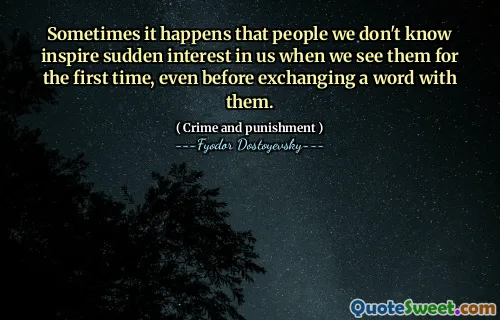"Crime and Punishment" is a profound novel by Fyodor Dostoevsky, centered on the internal struggle of Raskolnikov, a former student living in poverty in St. Petersburg. He grapples with his beliefs and morality after committing a murder, convinced that extraordinary individuals have the right to transgress moral laws for the greater good. This philosophical dilemma serves as the novel's backbone, delving deeply into themes of guilt, redemption, and the psychological impact of crime.
Throughout the story, Raskolnikov encounters various characters that influence his journey, including Sonya, a compassionate young woman who becomes his moral compass, and Porfiry, the astute detective who suspects him. As Raskolnikov's mental state deteriorates, he experiences intense guilt and paranoia, leading him to question his theories and justifications for his actions. The narrative masterfully explores his psychological turmoil and the consequences of alienation from society.
The novel ultimately questions the nature of morality and justice, challenging the reader to consider the complexities of human behavior. Dostoevsky's exploration of suffering and the quest for redemption creates a rich, philosophical landscape. The climax culminates in Raskolnikov’s realization that true redemption comes from embracing love and compassion rather than isolating oneself from humanity.
More »
Today Birthdays
1729 -
Edmund Burke
1949 -
Haruki Murakami
1954 -
Howard Stern
1876 -
Jack London
1993 -
Zayn Malik
1951 -
Kirstie Alley
1863 -
Swami Vivekananda
1923 -
Alice Miller
1987 -
Naya Rivera
1825 -
Brooke Foss Westcott
1944 -
Joe Frazier
1951 -
Rush Limbaugh
1964 -
Jeff Bezos
1978 -
Jeremy Camp
1628 -
Charles Perrault
1856 -
John Singer Sargent
1970 -
Kaja Foglio
1953 -
Rick Santelli
1986 -
Gemma Arterton
1968 -
Raf Simons
1958 -
Christiane Amanpour
1966 -
Olivier Martinez
1996 -
Ella Henderson
1917 -
Maharishi Mahesh Yogi
1949 -
Ottmar Hitzfeld
1928 -
Ruth Brown
1968 -
Heather Mills
1946 -
George Duke
1968 -
Rachael Harris
1923 -
Ira Hayes
